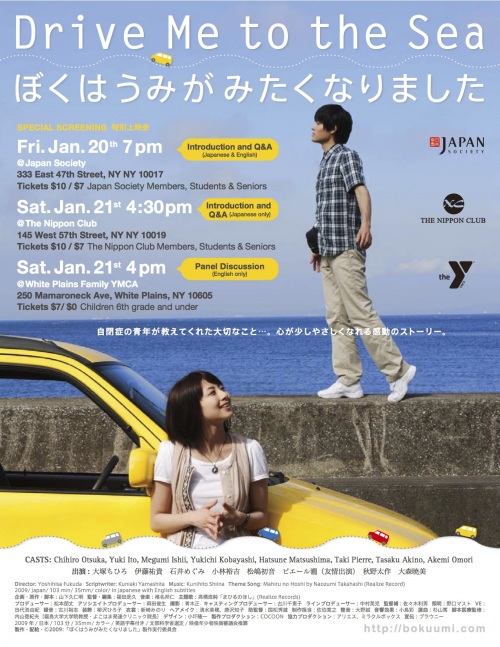Autism, a group of complex disorders involving brain development, is not widely discussed in Japan, and many families with autistic children find it difficult to receive proper schooling and support.
In recent years, however, the disorder is finding a voice, thanks in part to the TV and film industry.
In 2006 Boku no Aruku Michi was a popular television series which starred SMAP’s Tsuyoshi Kusanagi as a 31-year-old autistic man. Kusanagi won best actor at the 51st TV Drama Academy Awards in February 2007, validating the importance of exploring autism in mainstream Japan.
The 2009 film Drive Me to the Sea has also brought the discussion of autism to the forefront. Recently three New York-area screenings of Drive Me to the Sea played to sold-out audiences, despite snowy weather. Based on the 2002 book by Kuniaki Yamashita – who also wrote the screenplay – Drive Me to the Sea tells the story of Junichi, an autistic young man who goes for a ride to the sea with Asumi, a nursing student who offers Junichi a ride simply because he reminds her of someone she once knew. During the road trip she discovers that Junichi has autism, and she begins to understand the importance of accepting autistic people in the community.
“In the Japanese community it’s harder, I think, to have any disability,” says Nozomi Terao, founder and Executive Director of HappyDoll, Inc, a non-profit organization dedicated to connecting children around the world. HappyDoll, which has organized programs with autistic children, was one of the supporters of Drive Me to the Sea’s screenings at Japan Society, The Nippon Club, and the White Plains Family YMCA. “This type of movie in Japan,” continues Terao, “usually, it’s in a special category [not considered mainstream]. But Yamashita didn’t want that. He wanted everyone to watch.”
Yamashita has a direct connection to autism. When his son, Hiroki, was diagnosed with autism twenty years ago, there was very little information about the disorder in Japan. Yamashita, who was a scriptwriter for TV dramas, theatrical films, and comics, felt that as a writer, he could inform people about autism. Drive Me to the Sea is not the story of Yamashita and his son; rather Yamashita wrote it as a way to spread awareness of the disorder. Sadly, Hiroki died in an accident just as Yamashita began production on the film in 2006.
“I just really wrote the screenplay to escape from that sorrow,” Yamashita said through his interpreter, filmmaker Linda Hoaglund, at the Q&A session following the Japan Society screening. “When my director (Yoshihisa Fukuda) and I started to talk about who we most wanted to see the film, I most wanted parents of young people with developmental disabilities to see this film, and the director wanted to make a film for everybody to see.”
Through Yamashita’s grassroots efforts, many people are seeing this film. He did much of the groundwork to find places that would screen the movie, and little by little Drive Me to the Sea gained public interest. Now the film has been shown at more than 200 venues through independently organized screenings. All Nippon Airways (ANA), another sponsor of the screenings, has chosen Drive Me to the Sea as an in-flight movie during April and May.
“Autism is finally receiving the public attention it deserves,” says Masaaki Tanaka, the Senior Managing Executive Officer and CEO for the Americas of the Bank of Tokyo-Mitsubishi UFJ. Tanaka was instrumental in bringing Drive Me to the Sea to the West Coast when he worked at Union Bank of California.
Drive Me to the Sea is touching and emotional, but it has many funny moments. The same characteristics can be used to describe Yamashita, a warm and humble man whose demeanor is not what you’d expect from someone with a flashy film and TV resume. Before introducing the film, Yamashita admitted apprehension, as it was his first ever visit to the States. After the screening, he said, “I was nervous about how much of the film would translate, but your laughter dissuaded me of my anxiety.”
Through heartwarming films such as Yamashita’s Drive Me to the Sea, the general public should no longer be nervous about discussing autism.


Leave a Reply